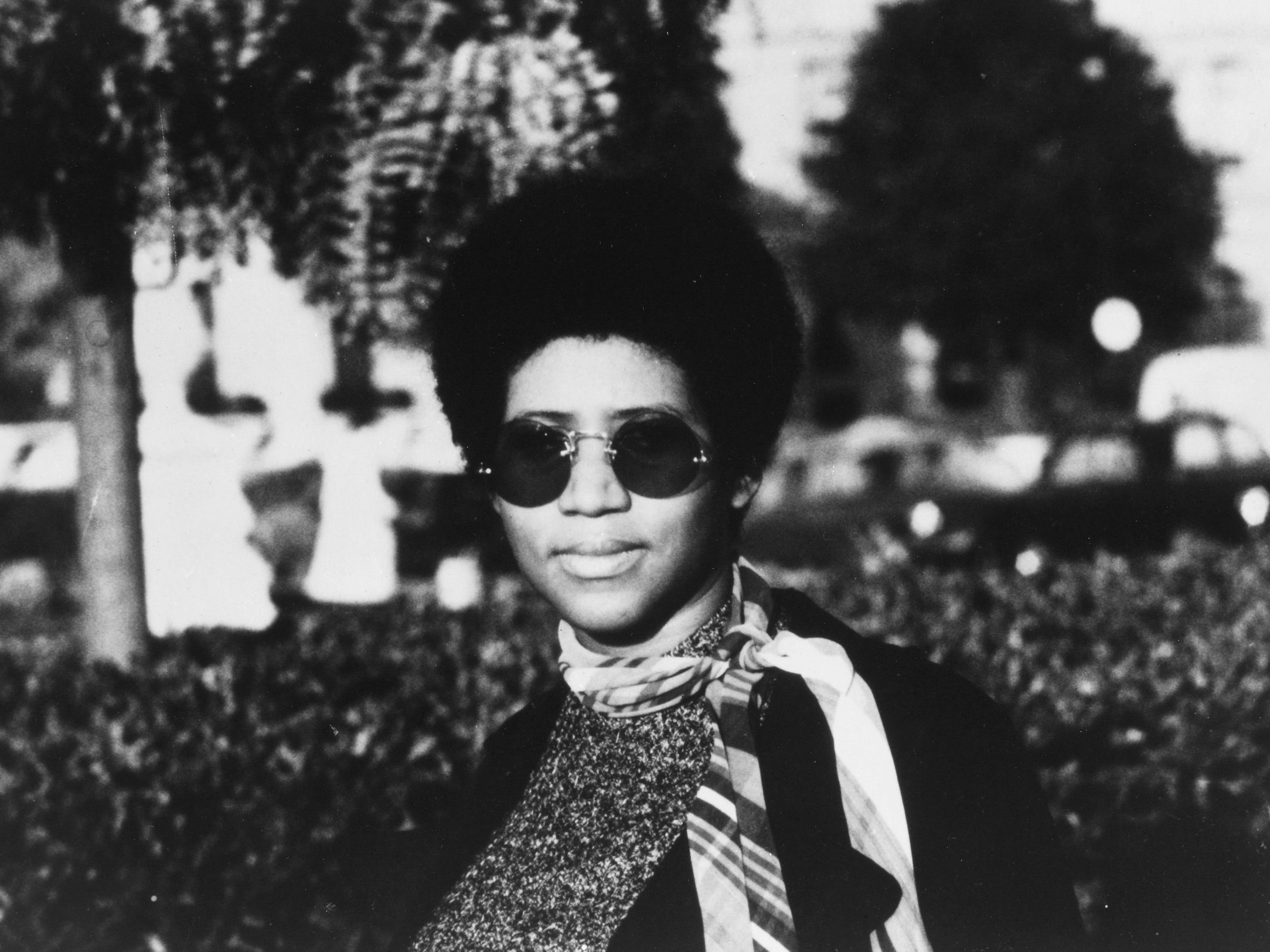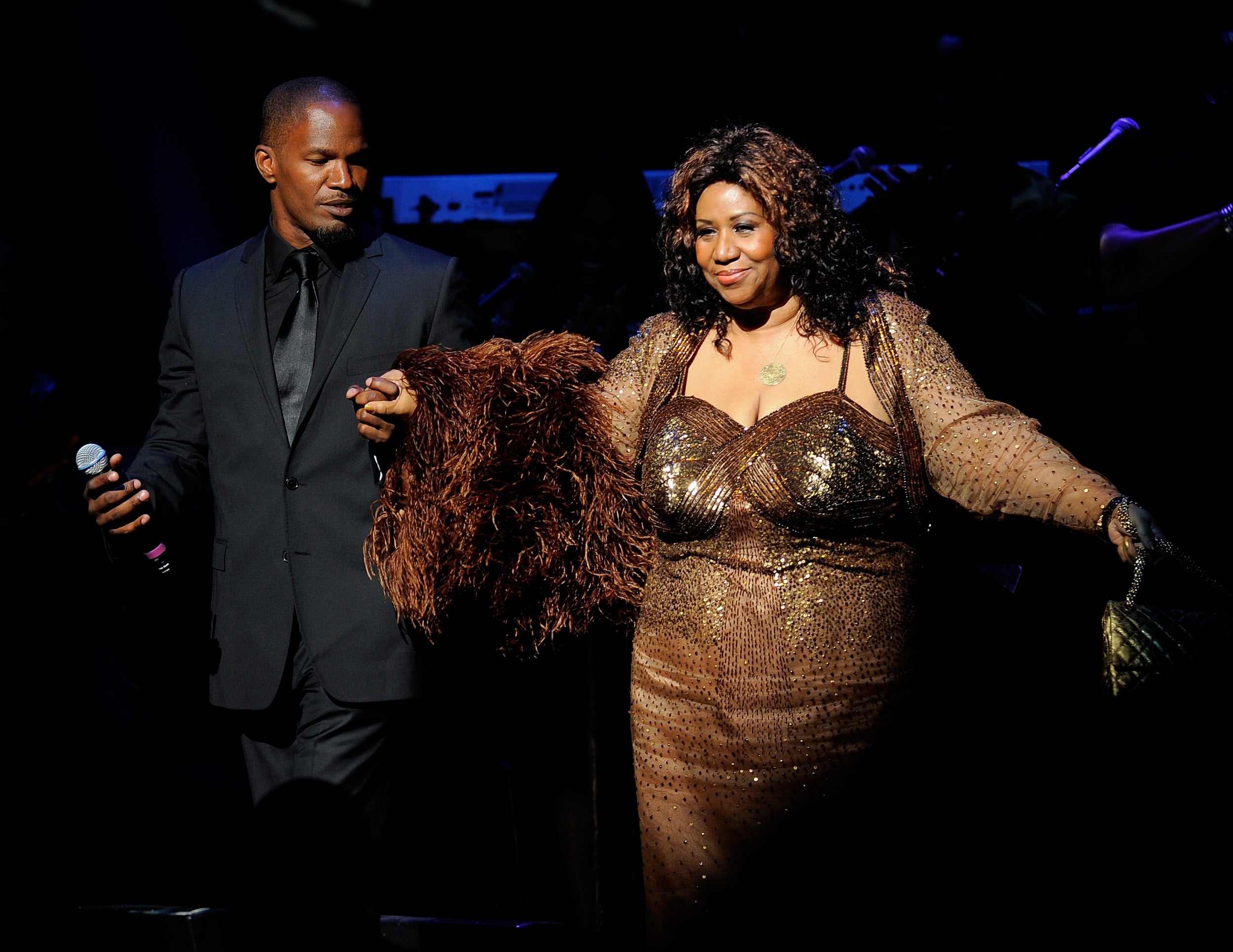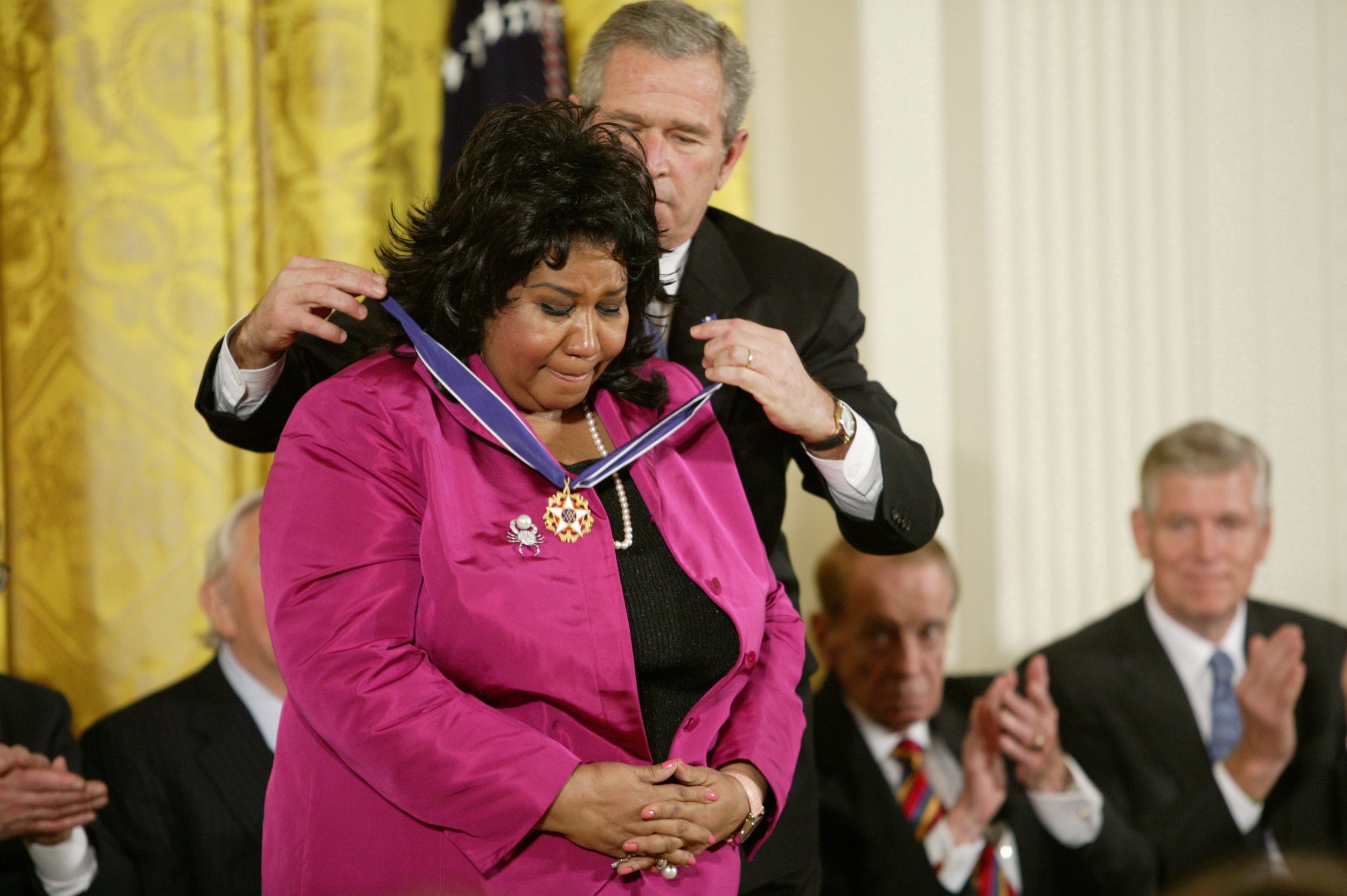Aretha Franklin: Queen of Soul who won 18 Grammys, sold 75 million records – and drew a tear from Obama
Regarded by many as the greatest singer of all time, Aretha Franklin bestrode 1960s and 70s R&B and sang at three presidents’ inaugurations
Your support helps us to tell the story
From reproductive rights to climate change to Big Tech, The Independent is on the ground when the story is developing. Whether it's investigating the financials of Elon Musk's pro-Trump PAC or producing our latest documentary, 'The A Word', which shines a light on the American women fighting for reproductive rights, we know how important it is to parse out the facts from the messaging.
At such a critical moment in US history, we need reporters on the ground. Your donation allows us to keep sending journalists to speak to both sides of the story.
The Independent is trusted by Americans across the entire political spectrum. And unlike many other quality news outlets, we choose not to lock Americans out of our reporting and analysis with paywalls. We believe quality journalism should be available to everyone, paid for by those who can afford it.
Your support makes all the difference.It was the moment a queen reduced a president to tears. Half a century after she gifted her sumptuous signature songs to the world, Aretha Franklin summoned all the vocal majesty that earned her the title of the Queen of Soul when she sang to President Obama in 2015.
The occasion was the 38th Annual Kennedy Center Honors Gala. Franklin strode on to the stage wearing a full-length fur coat and holding a clutch purse. She sat at the piano and began to accompany herself on “(You Make Me Feel Like) A Natural Woman”. Obama wiped a tear from his eye alongside a beaming first lady. The song’s co-writer, Carole King, leapt to her feet, gasping in amazement at the emotional depth and enduring purity of her delivery.
Before long Franklin rose from the piano. She allowed the fur – a Christmas present to herself 12 months earlier – to slip to the floor and strutted to centre stage. A year later, interviewed by Vogue, she explained that she was thinking: “Let’s get out of this coat. I’m feeling it. Let’s go!”. As she effortlessly hit the high notes, the president showed his pleasure by fist-pumping.
In September of the same year, Franklin had serenaded Pope Francis with “Amazing Grace” in Philadelphia. She also sang the “Nessun Dorma”, having previously performed it at the 1998 Grammy Awards ceremony after Luciano Pavarotti was indisposed by a sore throat.
Franklin, who has died aged 76, had been stealing hearts with her rich, luminous, pitch-perfect, soulful singing since she was a child.
In 1967 she “stole” “Respect” from the great Georgia soul man Otis Redding and made it arguably her greatest recording – although a case could be made for “I Say A Little Prayer”, “Chain of Fools”, “Think”, “Natural Woman” and others.

“I just lost my song!” howled Otis in mock indignation. “That girl took it away from me.” The 25-year-old Franklin’s magnificent interpretation was much more than an intriguing cover; it was an almighty appropriation, a musical heist. From that moment, the track was always identified with Franklin, not poor Otis.
Franklin’s performance on this funky slab of southern soul epitomised her vocal prowess. Radiating sassy confidence and gospel fire, she burned a sanctified path through the secular song, famously whooping, “R-E-S-P-E-C-T – find out what it means to me!” One of the great recordings of the past 60 years, it became a million-selling song and was also embraced as an anthem of black liberation and female equality. Some perceived it as an appeal for racial tolerance.
An R&B and pop No 1, “Respect” detonated Aretha Franklin’s career skywards. Over the next seven years she consistently hit the R&B and pop top 10. In fact, 17 songs leapt to the top of the US R&B chart. Commenting on Franklin’s dominance of the airwaves, the comedian and activist Dick Gregory noted: “You’d hear Aretha three or four times an hour. You’d only hear [Martin Luther] King on the news.” She also won the first eight Grammys presented for Best R&B Female Performance. The prize was soon dubbed the Aretha Franklin Award.
The late Sixties and early Seventies were Franklin’s artistic golden years. However, she also became an icon of the age, a symbol of African American womanhood. Hence the accolade Queen of Soul – a title no one ever managed to wrest from her.
One of five siblings, Aretha Franklin was born in 1942 in Memphis. Two years later the family moved to Detroit. Her upbringing there was steeped in the black gospel tradition and civil rights politics. Aretha’s mother, Barbara Franklin (née Siggers), was a celebrated gospel singer. Her father, the Reverend CL Franklin, was a well known, charismatic pastor. He preached at Detroit’s New Bethel Baptist Church, a 4,500-capacity building packed every Sunday. Chess Records in Chicago released more than 50 of his sermons on vinyl.
The family house on the East Side of Detroit bustled with musical distractions. “The radio was going on in one room,” Aretha once recalled, “the record player in another, the piano banging away in the living room.”
Understandably, she was inspired to sing and play the piano at an early age. Famous black musicians passed through the Franklin home, among them Duke Ellington, Sam Cooke and Nat King Cole, as did gospel stars Mahalia Jackson and Clara Ward, the latter a prime, early influence on Aretha. In 1952, these itinerant singers also offered maternal support to Aretha, her brother and three sisters when their mother died.
The Rev Franklin was a confidant of Martin Luther King, another frequent guest. Aretha idolised King and years later, in 1968 she performed “Precious Lord” at his funeral. Back in mid-Fifties Detroit, though, young Aretha was integrating herself into her father’s church choir, singing her first solo at the age of 12. She also toured America with him.

In 1956, Joe Von Battle, the man who had captured Pastor Franklin’s sermons on tape for Chess, cut one of Aretha’s church performances. In the recording, she exudes potential. Although she is just 14, it is recognisably Aretha Franklin, and her singing and piano work are compelling.
Because of her remarkable voice that Franklin’s deft keyboard skills – she played on the hit version of “Natural Woman” – were often overlooked. Smokey Robinson once commented: “When Aretha was a child, she could play nearly like she plays now.” Indeed, her piano style endowed much of her later work for Atlantic with its “churchy” feel. The 1956 recording was released as Songs of Faith in 1964 and reissued on CD as Aretha Gospel.
Her early career developed against a backdrop of personal turmoil. Before she had turned 13 she gave birth to a son, Clarence, and a second baby, Edward, arrived when she was 14. She had two further sons, Ted White Jr, when she was 22, and Kecalf, at the age of 28. All the children had different fathers.
In 1959 Motown arrived. Allegedly, the budding Detroit label was interested in Franklin, but her eyes were fixed on New York. In 1960, armed with her demo of “Today I Sing the Blues”, she travelled to the Big Apple, approaching John Hammond, famed A&R man at Columbia. He promptly signed her, describing her voice as “an untutored genius, the best I’ve heard since Billie Holiday’s”.
Franklin’s 10 albums for Columbia have caused much debate. Although the label principally pushed her as a jazz singer, she also cut ballads and blues, while her 1965 LP, Running Out of Fools, is undiluted pop. The critical consensus regarding those years is that the company did not really know how to package her, create the right setting or coax out her strengths. One of the few Columbia tracks that suggested her R&B potential was “Lee Cross”, a fiery soul belter from 1966, the year her Columbia contract expired and the year Jerry Wexler, Atlantic’s legendary producer and vice-president, was waiting to pounce.
Franklin teaming with Atlantic was undoubtedly an inspired coupling; the right people meeting at the right time and generating extraordinary results. Wexler later explained: “I took her to the church, sat her down at the piano and let her be herself.” Intent on emphasising the gospel roots of her voice, he opted to record her, not in New York, but in a funky, organic southern context at Rick Hall’s Fame studio. This was in Muscle Shoals, Alabama, where some of the finest Southern R&B session musicians worked.
Allegedly, a few of the Muscle Shoals Rhythm Section were lazing around the studio that day, unaware of her reputation. One of the musicians, Dan Penn, who composed, “Do Right Woman, Do Right Man” for Franklin’s Atlantic debut, yelled at them: “You better get your damn shoes on, you’re getting someone who can sing!” They didn’t bother to move until Franklin finally entered the studio. Walking over to the piano, she hit a “magic chord”. In a second, the lounging musicians were “like little bees buzzing around the queen”.
The session keyboardist Spooner Oldham generously suggested that Franklin continue playing piano during the recording while he moved to the Wurlitzer electric piano and organ. This set a precedent for all of Franklin’s future recordings with Wexler.
Franklin cut just one track, “I Never Loved a Man (The Way I Love You)”, at Muscle Shoals that day, although the same musicians were taken to New York to cut myriad Franklin sides. Finally, it seems, Wexler had created the perfect milieu to unleash her true soul. And the results were immediate. “Never Loved a Man” hit No 9 in the US pop chart. This was swiftly followed by “Respect”. The song reverberated through the summer of ’67, Ebony magazine declaring it the season of “Retha, Rap and Revolt” – rap was a reference to the Black Panther leader H Rap Brown).
In the following 18 months, Franklin blitzed the charts with classics like “Natural Woman”, “Baby I Love You”, “Chain of Fools”, “I Say a Little Prayer”, “See Saw” and “Think”. Her albums were massive sellers, too. In her first 12 months at Atlantic, she recorded four masterpieces, I Never Loved a Man The Way I Love You, Aretha Arrives, Lady Soul and Aretha Now, all entering the top five in the US pop album charts. In February 1968, Detroit celebrated Aretha Franklin Day.
Although Franklin’s music was essentially apolitical, some sensed an implicit racial message in a few of her recordings, most notably in “Respect” but also in something like “Chain of Fools” in which she sang, “One of these mornings that chain is going to break.” It was possible to interpret the lyrics as simply about male/female relationships or appraise them in a wider, social context. Franklin was subsequently appreciated by both black moderates and militants alike, quickly maturing into one of the black revolutionary movement’s chief female icons.
Jazz singer Lena Horne claimed that “inside every woman there’s an Aretha Franklin screaming to get out”. Indeed, it was the combination of her vocal gymnastics, fantastic songs and charisma – sometimes sweet, sometimes sassy – that created her crossover appeal. Importantly, she always seemed accessible, a confident, principled woman battling with difficulties and a few insecurities. Certainly, her eight-year marriage to manager Ted White, with whom she bore a son, Teddy Jr, was often nightmarish. She also suffered from a debilitating fear of flying and struggled with her weight.
Franklin’s run of late-Sixties Atlantic classics flowed into the early Seventies. Tracks like “Spanish Harlem”, “Bridge Over Troubled Water” and “Until You Come Back To Me” were all substantial pop and R&B hits. She also continued recording consummate albums such as This Girl’s In Love With You and Young, Gifted and Black, mostly sticking to the eclectic blueprint of inspired covers and originals. Two of her most exceptional albums of this time were a couple of live recordings, Aretha Live at Fillmore West and Amazing Grace.

The former was cut at the eponymous San Francisco rock venue. A scorching live performance, it included “Spirit in the Dark (Reprise)”, a mesmerising duet with Ray Charles. Witnessing the show, a journalist from Creem magazine wrote: “Aretha is the only performer who can move you and get you so high that the music becomes a blank.”
“Amazing Grace” was recorded with the Rev James Cleveland and the Southern California Community Choir in LA’s New Temple Missionary Baptist Church. Sydney Pollack filmed the event. In a traditional gospel set, Franklin’s voice is a mercurial delight – soaring, swooping, gliding. Columbia’s John Hammond wrote the sleeve notes, describing the album as “the final breakthrough of black gospel music to mass appreciation”. The gospel album entered the top 10 pop album charts, winning Franklin her eighth Grammy.
Recalling her time at Atlantic, Franklin once said: “I feel the things we did together were dynamite. I’d also say they were some of the finest records of the Sixties and early Seventies.”
Up to 1975, her albums for the label were often excellent but, apart from the Curtis Mayfield-produced Sparkle from 1976, that disco-dominated part of the decade was not healthy, artistically or commercially, for Franklin. One high point was her marriage to the Cooley High actor Glynn Turman in 1978. They divorced in 1984 and she never remarried.

In 1980 Franklin switched from Atlantic to Arista and performed a cameo in The Blues Brothers. Like James Brown, another soul star featured in the film, it helped relaunch her career. In 1985, with “Who’s Zoomin’ Who” and “Freeway of Love”, she achieved her biggest hits for 11 years. Franklin never again achieved the kind of success as a recording artist she experienced in the late Sixties and early Seventies, yet she sold upwards of 75 million records and her 77 American Hot 100 entries included 17 in the top 10.
Among her recorded output were duets with James Brown, Whitney Houston, Eurythmics, John Legend, Fantasia Barrino and George Michael, reaching the No 1 with the latter on both sides of the Atlantic with “I Knew You Were Waiting (For Me)” in 1987. The same year, she cut her third gospel album, One Lord, One Faith, One Baptism, recorded at her father’s church, three years after he died. For A Rose is Still a Rose (1998) and So Damn Happy (2003) Franklin collaborated with hip hop artists, including Lauryn Hill, Puff Daddy and Mary J Blige.
Despite her pop-orientated work during these years, the reverence for her talent never faltered. She sang at the inauguration of three presidents – Jimmy Carter, Bill Clinton and Barack Obama – received the Presidential Medal of Freedom from George W Bush and honorary doctorates from Harvard and Yale. In 1987, she was the first woman inducted into the Rock and Roll Hall of Fame. In 1995, she was presented with a Grammy Lifetime Achievement award.
Illness stalked Franklin in her later years and she reportedly had a tumour removed in 2010. Although she denied reports that she had pancreatic cancer, when she last played Detroit she ended by asking her adoring audience to “please keep me in your prayers”.
She continued to make albums. In 2011, A Woman Falling Out of Love was released. In an interview that spanned her struggles with dieting and men, The Independent asked who the love of her life was. “I’m much too young to answer that question,” she replied.
Aretha Franklin Sings the Great Diva Classics (2014) was widely dismissed as being too middle of the road. Her rendition of Adele’s “Rolling in the Deep” was exempted from criticism, especially after a storming performance on The Late Show With David Letterman. Last year, Brand New Me (2017) saw backings by the Royal Philharmonic Orchestra grafted on to her greatest songs.
As a live artist, however, she remained mesmerising. A strong supporter of the Democratic Party, she teamed up with former Republican secretary of state Condoleezza Rice in Philadelphia at a concert for a children’s charity in 2010. Rice accompanied her on piano for “I Say a Little Prayer” before 8,000 people.
What proved to be her final performance came last November at a benefit for Elton John’s Aids Foundation in New York. Sir Elton introduced her as “the greatest singer of all time”. In 2010 a panel of 179 “experts” bestowed the same title upon her in a poll for Rolling Stone magazine.
She will ultimately be remembered for her amazing, transcendent voice – full of joy, sweetness and soul. It affected presidents, popes, paupers and people the world over. Franklin herself once explained: “If a song’s about something I’ve experienced or that could’ve happened to me, it’s good. I look for something meaningful. When I go into the studio, I put everything into it.”
Aretha Louise Franklin, singer, born 25 March 1942, died 16 August 2018
Subscribe to Independent Premium to bookmark this article
Want to bookmark your favourite articles and stories to read or reference later? Start your Independent Premium subscription today.

Join our commenting forum
Join thought-provoking conversations, follow other Independent readers and see their replies
Comments